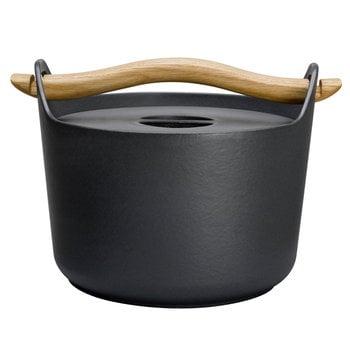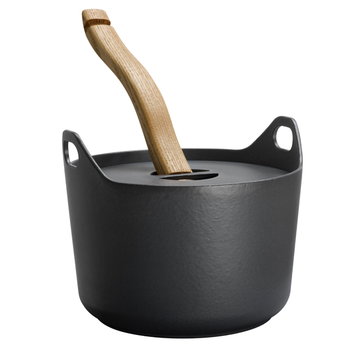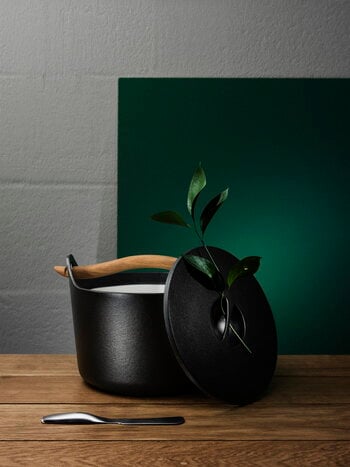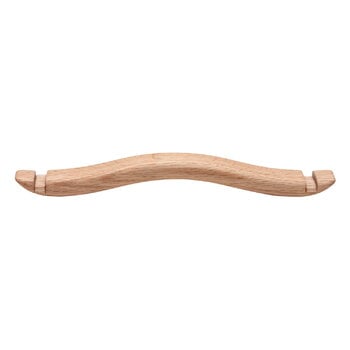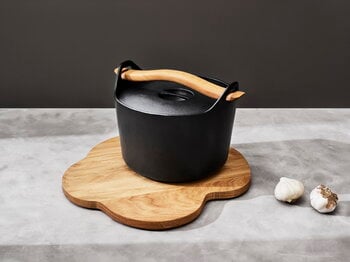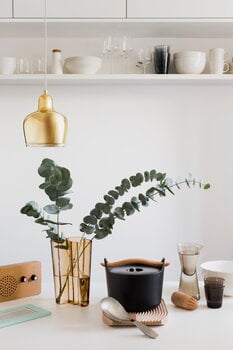The Sarpaneva cast iron pot, designed in 1960 by Finnish design legend Timo Sarpaneva, is a bona fide Scandinavian design classic. The heavy cast iron pot cooks food evenly both on the stove and in the oven, making it ideal for any hearty meal: stews, slow cooked bolognese or even a whole roast chicken. The detachable wooden handle makes it easy to lift either the whole pot or only the lid without burning one's fingers, while the enamel coating prevents food flavours from sticking to the pot’s surface, so the same pot can be used for a variety of dishes. The award-winning, streamlined casserole dish is the perfect piece of cookware for all friends of good food and modern Scandinavian design.
Sarpaneva cast iron pot 3 L
Iittala
Description
The Sarpaneva cast iron pot, designed in 1960 by Finnish design legend Timo Sarpaneva, is a bona fide Scandinavian design classic. The heavy cast iron pot cooks food evenly both on the stove and in the oven, making it ideal for any hearty meal: stews, slow cooked bolognese or even a whole roast chicken. The detachable wooden handle makes it easy to lift either the whole pot or only the lid without burning one's fingers, while the enamel coating prevents food flavours from sticking to the pot’s surface, so the same pot can be used for a variety of dishes. The award-winning, streamlined casserole dish is the perfect piece of cookware for all friends of good food and modern Scandinavian design.
Product details (4)
- Material
- Cast iron with enameled inside, wooden handle
- Capacity
- 3 l
- Notes
- Suitable for all hobs. Oven safe without the handle.
- Care instructions
- Use wooden or plastic utensils to avoid scratching the enamel. Wash by hand.
- Product ID
Designer
Timo Sarpaneva (1926-2006) was a Finnish designer who contributed to making Finnish design well-known in the world. He graduated from the Institute for Industrial Arts (the forerunner of the University of Arts and Design Helsinki) in 1948. Even though he was trained as a graphic designer, he spent the majority of his life working as an industrial designer.
He is famous for his glassware – glass was his favourite material but he was also a master of materials such as porcelain, cast iron and textile – as well as graphic art. For Iittala he designed for instance works of art such as the collection of Claritas vases (1983) and the Orkidea vase (1953). Other products designed for Iittala are, among the others, his famous cast iron pot and Festivo candleholders, and in 1956 he designed for Iittala the company’s famous i-logo. He worked for Iittala until his death on 6th October 2006, aged 79. For his works Timo Sarpaneva received many prestigious awards, including the Lunning Prize, the Pro Finlandia medal and the Grand Prix at the Milan Triennale. His works are represented in several museums’ collections worldwide.
View all products
Reviews (19)
4.68
Based on 19 reviews
-
K
Karin B
This is the most beautifully crafted pot I have ever laid my eyes on. Everything about it is form follows function, which makes it an exemplary work of design. It embodies everything there is to know about cooking from the stone age to now. Love it.
385 days ago
-
L
Lynn H
Edmonds, United States
I love it! I received this as a wedding gift 51 years ago and it got lost in a move. I found it on your website and ordered it and it is just as I remembered it many years ago. It is great to have this great piece back in my home! Lynn Hanson
448 days ago
-
S
susanna v
Suisun, United States
I love my new sarpaneva cast iron pot. It's exactly what I wanted. Thank You!
330 days ago
Sustainability
The Product Sustainability Framework, our criteria of sustainable design, helps you find the most sustainable products in our selection. Read below which sustainability criteria this product has met.
Working conditions & labour 8/9
-
Equal opportunities for all employees
-
Commitment to UN Global Compact, fair compensation for all employees
-
Corporate responsibility requirements defined and communicated for suppliers
-
Systematic work for improved inclusion and well-being in the workplace
-
Transparent supply chain
-
Suppliers' compliance to a code of conduct ensured
-
Compliance to the UN Guiding Principles on Business and Human Rights ensured in the supply chain
-
Support for community involvement in the supply chain
-
Direct suppliers audited and certified
Eco-friendly production 7/9
-
Fair and resource-wise water-use in production
-
No incineration or landfilling of returned items
-
No use of endangered species as materials
-
No direct environmental emissions or waste (excl. GHGs) from production
-
The sustainability of direct suppliers' production is addressed and monitored
-
Material-efficient and ecological packaging
-
Positive impact on nature’s well-being through operations that regenerate natural ecosystems
-
Production and material sourcing that respect biodiversity, animal rights, and natural ecosystems
-
No potentially harmful chemicals used in own production
Climate impact 5/8
-
Company's direct greenhouse gas emissions identified and commitment to reduction
-
Product's carbon impact identified and commitment to reduction
-
Guidance on energy- and eco-efficient use of the product
-
Contribution to climate initiatives beyond the brand’s direct operations
-
Low-carbon or compensated transportation
-
Carbon footprint of the product calculated and goals set to reduce it
-
100 % renewable energy in own production and operations
-
Carbon neutral or carbon negative product
Sustainable materials 4/6
-
Sustainable and long-lasting material choices
-
No harmful or hazardous substances
-
Responsible raw material sourcing and production
-
Materials suited for circularity: monomaterials, recyclable finishings, renewable or recycled contents etc.
-
Ecological materials: natural, biodegradable, recyclable or recycled contents
-
Outstanding materials in terms of innovativeness, responsibility, sustainability and circularity: local production or sourcing, 100 % recycled content, C2C-certification etc.
Circular design 3/5
-
High aesthetic quality promoting long-term use of the product
-
Technically durable product design and material choices
-
Design for enduring life-long quality
-
Design and support for product maintenance, repair and upgradability
-
Innovative circular design solutions: circular service system, resale platform, remanufacturing, collection of used products, etc.
